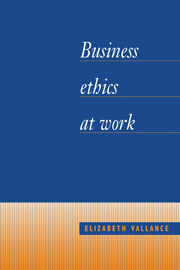1 - The ethics of business
Published online by Cambridge University Press: 05 June 2012
Summary
The secret of life is honesty and fair dealing. If you can fake that, you've got it made.
(Groucho Marx)He was as great as a man could be without virtue.
(Lord Acton on Napoleon)WHY ETHICS?
People in business make decisions every day which affect the rights and interests of others, both those within the business and those outside. Rights and interests are the basic stuff of ethical debate. Such decisions are made on the basis of assumptions – about the business's aims and aspirations; about what is owed to other people; about underlying values and direction. It is one of the central arguments of this book that it is better that such assumptions be made overt, so that they can be acknowledged and argued about, rather than remaining unspoken and therefore unchallenged and undiscussed.
It is sometimes suggested that business decisions are technical decisions, that is, that they are taken in the light of specific information which can be processed by means of modern business methods to give specific answers to questions of investment, divestiture, etc. On this view, financial techniques such as establishing an internal rate of return (IRR) or a pay-back in effect make the decision for us. Ethics is at best redundant, at worst misleading, diverting business from its real task of maximising profits. Yet almost all business decisions are more complex than this would suggest. They involve calculations not only of return on investment but of effects on employees, customers, the community, the environment – none of which can be reduced to simple algebra.
- Type
- Chapter
- Information
- Business Ethics at Work , pp. 11 - 25Publisher: Cambridge University PressPrint publication year: 1995



